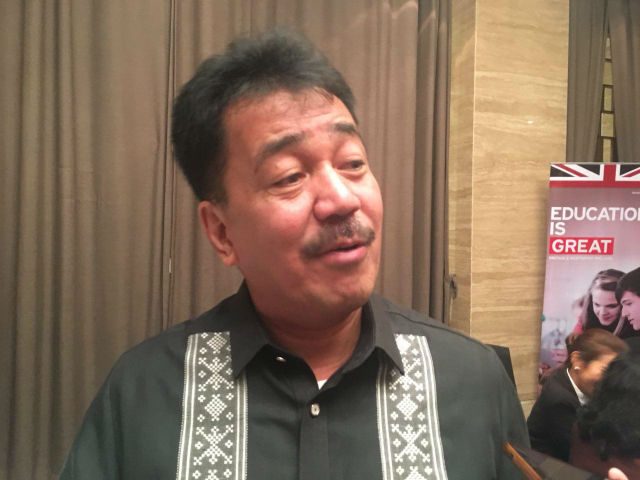SUMMARY
This is AI generated summarization, which may have errors. For context, always refer to the full article.

MANILA, Philippines – Newly appointed Commission on Higher Education (CHED) officer-in-charge (OIC) Prospero de Vera III promised to finish the implementing rules and regulations (IRR) of the free tuition law by next week.
“My commitment is that by February 22, we would finish it and have it signed and put it out publicly after that,” said De Vera on the sidelines of the first Philippines-United Kingdom Transnational Education Conference and Education Fair held on Friday, February 16.
He acknowledged several sectors have expressed their “impatience” over the delay in the publishing of the IRR, which former CHED chairperson Patricia Licuanan said was ready for signing as December 5, 2017.
But De Vera, who was appointed as OIC after Licuanan’s resignation last month, said CHED is still ironing out several provisions in the IRR.
He explained it takes time to finish such provisions because Republic Act No. 10931 is a “complicated” law, which no other developing country in Asia has implemented before.
“My answer is, first, it’s a rather complicated law. We’ve never tried it. No developing country in the region has tried it. And so, a lot of the things that we’re intending to do, we’re starting essentially from scratch,” said De Vera.
One tricky set of guidelines involves the national student loan program. De Vera said the provisions are difficult to craft given the bad track record of Filipino students in paying off their loans.
“Study now, pay later became study now, pay never. And their payment rate is lower than 10%. And so we cannot continue with what we’re doing before because it’s going to waste public funds. So you have to work with government financial institutions, you’ve got to work with private banks, you’ve got to re-conceptualize it,” said De Vera.
The IRR will also contain provisions requiring state universities and colleges (SUCs) to develop affirmative action programs so more students from “disadvantaged” sectors and regions will enroll.
De Vera said CHED is also incorporating a return service system in the free tuition law’s IRR.
“And so, it takes a little bit of effort to craft implementing guidelines on things that we have never done in this country,” he said.
In 2017, President Rodrigo Duterte signed into law the Universal Access to Quality Tertiary Education Act, which mandates the non-collection of tuition and other fees in all 112 SUCs nationwide. (READ: What’s next after SUCs’ non-collection of tuition in the 1st semester?)
Several issues plague the law, however, including the source of its funds and how implementing agencies can assure the public that it would cater to what it was truly meant for – financing the education of less financially able students. (READ: Who will benefit from the free tuition law?)
CHED did not originally include any allocation for RA 10931 in its proposed budget for 2018 as Duterte was not expected to sign it. His economic managers strongly opposed the bill given the huge funding it needs.
But lawmakers managed to re-align funds in the 2018 budget to allocate P51.4 billion for the free tuition law’s first year of implementation. – Rappler.com
Add a comment
How does this make you feel?
There are no comments yet. Add your comment to start the conversation.